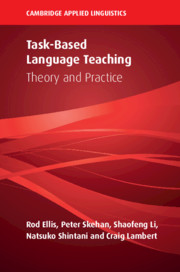Book contents
- Task-Based Language Teaching
- The Cambridge Applied Linguistics Series
- Task-Based Language Teaching
- Copyright page
- Contents
- Figures
- Tables
- Series Editors’ Preface
- Authors’ Preface
- Part I Introduction
- Part II Theoretical Perspectives
- Part III Pedagogical Perspectives
- Part IV Investigating Task-Based Programmes
- 10 Comparative Method Studies
- 11 Evaluating Task-Based Language Teaching
- Part V Moving Forward
- Endnotes
- References
- Index
11 - Evaluating Task-Based Language Teaching
from Part IV - Investigating Task-Based Programmes
Published online by Cambridge University Press: 07 October 2019
- Task-Based Language Teaching
- The Cambridge Applied Linguistics Series
- Task-Based Language Teaching
- Copyright page
- Contents
- Figures
- Tables
- Series Editors’ Preface
- Authors’ Preface
- Part I Introduction
- Part II Theoretical Perspectives
- Part III Pedagogical Perspectives
- Part IV Investigating Task-Based Programmes
- 10 Comparative Method Studies
- 11 Evaluating Task-Based Language Teaching
- Part V Moving Forward
- Endnotes
- References
- Index
Summary
Chapter 11 examines what evaluation studies tell us about the effectiveness of TBLT. These studies are practice oriented, addressing whether TBLT ‘works’ and what might be done to make it work more effectively. The chapter begins with a discussion of TBLT as an innovation and illustrates how the factors that affect the success of educational innovations in general can predict and explain the success or failure of particular TBLT programmes. The chapter then reviews a number of actual evaluations – both macro-evaluations of complete TBLT programmes and micro-evaluations carried out by teachers implementing specific tasks in their own classrooms. Drawing on these evaluations, the chapter ends with a discussion of the major problems that teachers face in implementing TBLT and suggests some solutions.
Keywords
Information
- Type
- Chapter
- Information
- Task-Based Language TeachingTheory and Practice, pp. 303 - 330Publisher: Cambridge University PressPrint publication year: 2019
Accessibility standard: Unknown
Why this information is here
This section outlines the accessibility features of this content - including support for screen readers, full keyboard navigation and high-contrast display options. This may not be relevant for you.Accessibility Information
- 1
- Cited by
